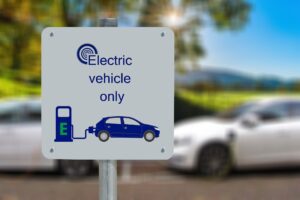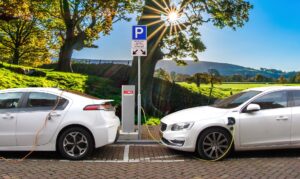How far can an electric car go on one charge? Electric cars are becoming more and more popular every day. Many people are curious about how far they can go on a single charge. In this blog post, we will explore that topic in depth. We will answer the question of how far an electric car can go on one charge, as well as discuss some of the pros and cons of owning an electric vehicle.
How Far Can An Electric Car Go On One Charge?
Have you ever wondered how far an electric car can go on one charge? It turns out that it depends on a number of factors, including the type of car, the size of the battery, and how the car is being driven. For example, a Tesla Model S with a large battery pack can travel up to 300 miles on a single charge, while a smaller electric car like the Nissan Leaf may only be able to travel 100 miles.
Additionally, how you drive your car can also affect how far it can go on one charge. For example, if you regularly drive at high speeds or use lots of heat or air conditioning, your battery will drain more quickly than if you drove more slowly and kept the climate control off. Ultimately, how far an electric car can travel on one charge is a complex question with no simple answer. However, with careful planning and consideration of all the factors involved, you can make sure that your electric car can take you where you need to go.
The Pros and Cons of Owning an Electric Vehicle

There are a lot of things to consider when thinking about making the switch to an electric vehicle. On the one hand, electric cars are much more environmentally friendly than gas-powered cars, and they’re also very quiet. They also tend to have a lot of torque, so they accelerate quickly. On the other hand, electric cars can be more expensive than gas-powered cars, and they also have shorter ranges before needing to be recharged. So, how do you decide whether an electric car is right for you? Here are some things to consider.
How far do you typically drive in a day? If you only ever drive short distances, then an electric car might be a good option for you. But if you often find yourself driving long distances, you might want to stick with a gas-powered car.
How much money are you willing to spend? Electric cars can be more expensive than gas-powered cars, both upfront and in terms of maintenance. However, there may be government incentives available that can offset some of the costs.
What’s your driving style? If you like to zip around town and make quick starts and stops, an electric car might be a good fit for you.
What Are The Benefits of Driving an Electric Car?
Many people are interested in purchasing an electric car, but they may not be sure how far they can travel on one charge. With advances in technology, electric cars are becoming more and more popular each year. Electric cars have many benefits over traditional gasoline-powered cars. They are much cheaper to operate and maintain, and they emit no pollutants.
Electric cars also have a smaller environmental footprint than gasoline-powered cars. If you are considering purchasing an electric car, it is important to know how far you can travel on one charge. Most electric cars can travel between 100 and 200 miles on a single charge. However, this range will vary depending on the make and model of the car.
Some electric cars also have the ability to recharge while you are driving, so you can extend your range even further. Ultimately, electric cars offer a clean and efficient alternative to traditional gasoline-powered cars, and they are becoming increasingly popular each year.
What Are The Disadvantages of Driving an Electric Car?

One of the disadvantages of driving an electric car is how far it can go on one charge. An electric car typically has a range of only 100-200 miles on a single charge, while a gas car can easily travel 300-400 miles on a tank of gas. This means that electric car owners need to be more conscious of their driving habits and plan their trips accordingly.
Another disadvantage of electric cars is the time it takes to charge the battery. A full charge can take anywhere from 4-8 hours, depending on the charger used and the size of the battery. This can be a major inconvenience for drivers who are used to being able to refuel their cars in just a few minutes.
Finally, electric cars are still relatively expensive, with the average model costing around $30,000. This is significantly more than most gas cars, although prices are expected to come down as more and more people switch to electric vehicles.
Is an Electric Car Right For Me?
I wake up each morning and stretch my arm out to the open world outside my window. I can feel the fresh grass on my fingertips and the sun on my face. As I walk to my car, I can smell the flowers in the air. The electric car is perfect for me because it doesn’t produce emissions that pollute the air.
It also doesn’t require oil changes or tune-ups, and it’s cheaper to operate than a gas car. Electric cars are powered by electricity from batteries, which can be recharged by plugging the car into an outlet. Most electric cars can travel about 100 miles on a charge, though this number varies depending on the model of the car and how it’s driven.
Considering whether an electric car is right for you, consider how far you typically drive in a day or week. An electric car might be a good option if you don’t drive long distances often and if you have access to charging stations.
What Are The Different Types of Electric Cars?

Electric cars are becoming increasingly popular as people look for more sustainable and environmentally friendly ways to travel. But what exactly are electric cars? And how do they work?
Electric cars are powered by batteries, which store electricity that can then be used to run the engine. There are two main types of electric cars: those that use a plug-in battery, and those that use an onboard charger. Plug-in electric cars can be recharged by plugging them into an external power source, such as a socket in your home or a public charging point. Onboard charger electric cars have a charging unit built into the car, which means they can be plugged into any standard electrical outlet.
Electric cars have a number of advantages over traditional petrol or diesel cars. For example, they emit no pollutants or greenhouse gases, so they’re much better for the environment. They’re also much cheaper to run since you only need to charge the battery rather than buying/refilling fuel. Electric cars also tend to be very quiet, which some people find more relaxing when driving.
Read More;
